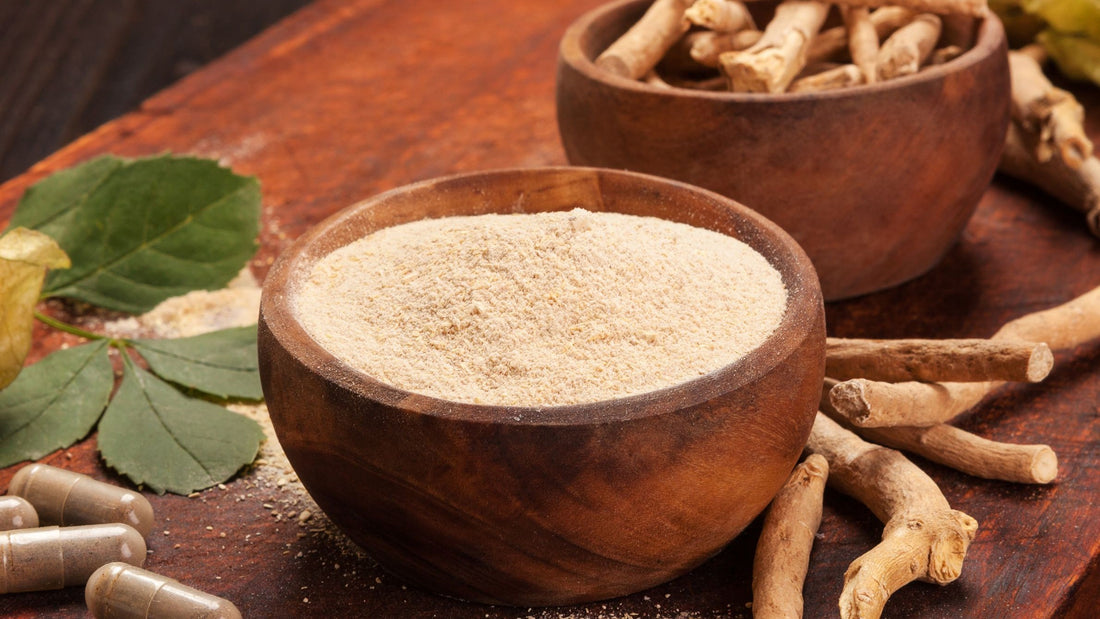Want To Know More About The Potential Benefits Of Taking Ashwagandha Root Extract? Read On!
Ashwagandha (Withania somnifera) is a traditional medicinal herb which has been used for thousands of years in Ayurvedic medicine. It is a small, evergreen perennial in the nightshade family and grows in India, the Middle East, and Africa. The roots (and sometimes leaves) of the plant are used for many different medicinal purposes.
Also known as Indian Ginseng, Winter Cherry or Smell of Horse, The use of ashwagandha supplements has soared over the last few years. Ashwagandha is considered to be an adaptogenic herb (An adaptogen is a natural substance that helps the body adapt to stress and maintain balance.). It’s an extremely popular herbal supplement that is being extensively researched for multiple applications.
From weight loss and thyroid problems, to brain function, fertility and anxiety, endurance, muscle strength and more, many claims have been made about the benefits of taking Ashwagandha capsules! Carry on reading to discover more about this powerful herb and the claims surrounding it.
Ashwagandha For Stress And Anxiety
Ashwagandha has been shown to have an impact on reducing stress and anxiety levels. It works by lowering cortisol levels, a hormone released in response to stress. Considered a natural anxiolytic, ashwagandha reduces stress and anxiety by regulating the body's stress response. When our bodies are experiencing stress cortisol is released, a hormone which prepares the body to respond to stress. Long term chronic stress and elevated cortisol levels can have negative effects on mental and physical health, leading to symptoms such as anxiety and depression.
Ashwagandha works by reducing cortisol levels, helping to reduce the impact of stress on the body. Studies have shown that ashwagandha can significantly reduce cortisol levels, leading to improved stress and anxiety levels.
In addition to reducing cortisol levels, ashwagandha is believed to have a positive effect on neurotransmitters such as serotonin and dopamine, which are involved in regulating mood and stress. By improving the balance of neurotransmitters in the brain, ashwagandha can help to lower stress and anxiety.
This amazing herb also has antioxidant and anti-inflammatory properties which help reduce oxidative stress and inflammation, both of which are linked to stress and anxiety.
Ashwagandha For Energy And Immunity
Ashwagandha helps to boost energy and immunity through several mechanisms:
-
As we found out above, ashwagandha has been shown to help reduce stress levels. Chronic stress can lead to fatigue and decreased energy levels, by reducing stress we can improve our energy levels.
-
The adrenal glands are responsible for producing hormones which regulate energy levels. Ashwagandha helps to improve adrenal function, leading to improved energy levels and a reduction in fatigue.
-
Ashwagandha has been shown to increase the production of white blood cells, which help to fight off infections and boost immunity. This study is interesting!
-
Reducing inflammation: Inflammation can weaken the immune system, reducing energy levels. Ashwagandha has anti-inflammatory properties, which can help reduce inflammation and improve overall health.
-
Increasing antioxidant levels: Antioxidants help to protect the body from damage caused by free radicals, which can weaken the immune system and reduce energy levels. As a rich source of antioxidants, it can help improve health and energy levels.
-
Ashwagandha For Endurance, Stamina And Muscle Mass
The fitness industry is extremely interested in the benefits of ashwagandha, with claims it can improve endurance and stamina. This study looked at elite cyclists and concluded that
“Ashwagandha improved the cardiorespiratory endurance of the elite athletes.”
An article by Men’s Health states that “The herb could supercharge your gym sessions, too, since it’s been shown to increase muscle mass, reduce body fat, and increase strength”.
There’s certainly plenty of studies and research looking into this area!
Ashwagandha Benefits For Women
What does ashwagandha do for women?
-
Ashwagandha and Libido: Recent research suggests that it improves sexual function and increases libido in women. A 2002 study of 80 women concluded that “ Oral administration of Ashwagandha 300mg twice daily administered for eight weeks improves the female sexual health in otherwise healthy women who do not have any hormonal disturbances. Ashwagandha is a known adaptogen, maintains general well-being and improves vitality.”
-
Ashwagandha and Fertility: Ashwagandha is thought to improve ovarian function and fertility by helping to improve the functioning of the thyroid gland. This in turn regulates reproductive hormones.
-
Ashwagandha and Menopause: Several studies on the use of ashwagandha for menopausal women indicate that it can help with symptoms, including hot flushes and night sweats. This study conducted in 2001 reaches the conclusion that “These findings suggest that ashwagandha root extract can be a safe and effective option to relieve mild to moderate climacteric symptoms during perimenopause in women.”
Ashwagandha Benefits For Men
What does ashwagandha do for men? Ashwagandha has several potential benefits:
-
Improving Testosterone levels: Low testosterone levels can cause a range of symptoms, including decreased energy, libido, and muscle mass. Ashwagandha has been shown to help increase testosterone levels, which can improve these symptoms.
-
May Enhance Fertility: Infertility is a common issue in men, which low testosterone levels can contribute to. Ashwagandha is thought to help increase testosterone levels, which can improve fertility.
-
Reducing Stress Ashwagandha helps to reduce stress levels, improving overall health and testosterone levels.
-
Helps Improve Sexual Function: Low testosterone levels can cause sexual dysfunction, including decreased libido and erectile dysfunction. An increase in testosterone levels can in turn improve sexual function.
What Is The Best Ashwagandha Dosage?
There is no recommended daily intake,and it does depend on your inidividual needs. However, most research suggests taking 250–500 milligrams (mg) per day.
Is Ashwagandha Safe?
It's important to note that while ashwagandha is generally considered safe, it may interact with certain medications and medical conditions. It's always best to consult a healthcare professional before starting any new supplement, especially if you have a medical condition you are taking medications, or if you are pregnant or breastfeeding.
Conclusion
Ashwagandha is a herb commonly used in Ayurvedic medicine to help reduce stress and anxiety, improve brain function, boost fertility and testosterone in men, aid in the balance of female hormones and enhance athletic performance.
If you have consulted a health professional and feel ashwagandha is suitable for you check out Soul Nutrients Ashwagandha 1000mg 90 Capsules - UK Brand- Ashwagandha Root Extract (5:1).
References:
Nasimi Doost Azgomi R, Zomorrodi A, Nazemyieh H, Fazljou SMB, Sadeghi Bazargani H, Nejatbakhsh F, Moini Jazani A, Ahmadi AsrBadr Y. Effects of Withania somnifera on Reproductive System: A Systematic Review of the Available Evidence. Biomed Res Int. 2018 Jan 24;2018:4076430. doi: 10.1155/2018/4076430. Erratum in: Biomed Res Int. 2019 Nov 21;2019:7591541. PMID: 29670898; PMCID: PMC5833251.
Speers AB, Cabey KA, Soumyanath A, Wright KM. Effects of Withania somnifera (Ashwagandha) on Stress and the Stress- Related Neuropsychiatric Disorders Anxiety, Depression, and Insomnia. Curr Neuropharmacol. 2021;19(9):1468-1495. doi: 10.2174/1570159X19666210712151556. PMID: 34254920; PMCID: PMC8762185.
Ajgaonkar A, Jain M, Debnath K. Efficacy and Safety of Ashwagandha (Withania somnifera) Root Extract for Improvement of Sexual Health in Healthy Women: A Prospective, Randomized, Placebo-Controlled Study. Cureus. 2022 Oct 28;14(10):e30787. doi: 10.7759/cureus.30787. PMID: 36447681; PMCID: PMC9701317.
Gopal S, Ajgaonkar A, Kanchi P, Kaundinya A, Thakare V, Chauhan S, Langade D. Effect of an ashwagandha (Withania Somnifera) root extract on climacteric symptoms in women during perimenopause: A randomized, double-blind, placebo-controlled study. J Obstet Gynaecol Res. 2021 Dec;47(12):4414-4425. doi: 10.1111/jog.15030. Epub 2021 Sep 22. PMID: 34553463.
Lopresti AL, Smith SJ, Malvi H, Kodgule R. An investigation into the stress-relieving and pharmacological actions of an ashwagandha (Withania somnifera) extract: A randomized, double-blind, placebo-controlled study. Medicine (Baltimore). 2019 Sep;98(37):e17186. doi: 10.1097/MD.0000000000017186. PMID: 31517876; PMCID: PMC6750292.
Ziauddin M, Phansalkar N, Patki P, Diwanay S, Patwardhan B. Studies on the immunomodulatory effects of Ashwagandha. J Ethnopharmacol. 1996 Feb;50(2):69-76. doi: 10.1016/0378-8741(95)01318-0. PMID: 8866726.
Shenoy S, Chaskar U, Sandhu JS, Paadhi MM. Effects of eight-week supplementation of Ashwagandha on cardiorespiratory endurance in elite Indian cyclists. J Ayurveda Integr Med. 2012 Oct;3(4):209-14. doi: 10.4103/0975-9476.104444. PMID: 23326093; PMCID: PMC3545242.
DISCLAIMER: THIS WEBSITE DOES NOT PROVIDE MEDICAL ADVICE
The information contained on this website, including but not limited to, text, graphics, images and other material are for informational purposes only. No material on this site is intended to be a substitute for professional medical advice, diagnosis or treatment. Always seek the advice of your GP or other qualified healthcare professional with any questions you may have regarding any medical condition or treatment and before undertaking a new health care regimen. Never disregard professional medical advice or delay in seeking it because of something you have read on this website.

